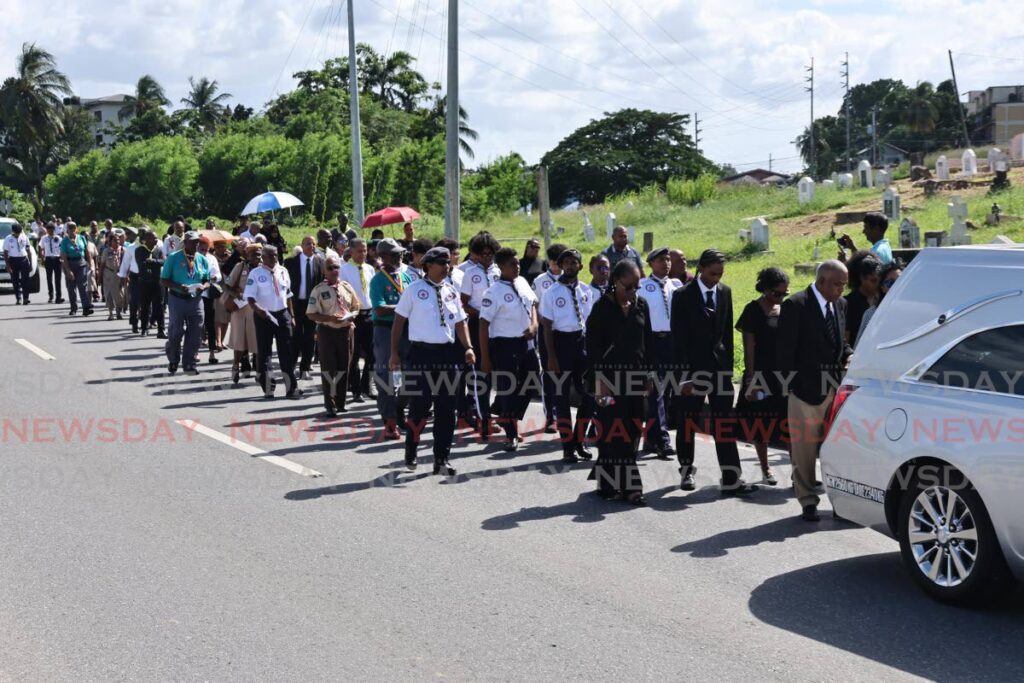Privy Council dismisses Finance Minister’s appeal in Auditor General impasse
 07 November 2024
07 November 2024


Auditor General Jawantie Ramdass leaves the Hall of Justice, Port of Spain after a hearing on June 17. - Photo by Jeff K. Mayers
THE Privy Council has dismissed an appeal filed by the Finance Minister Colm Imbert and the Cabinet challenging the Appeal Court's decision to allow Auditor General Jaiwantee Ramdass to pursue her lawsuit objecting to a probe of her approach to auditing the 2023 public accounts.
The ruling means her lawsuit will go ahead in the local high court.
On November 7, five Privy Council law lords – Hodge, Sales, Stephens, and Ladies Rose and Simler – gave their decision.
Two hours into submissions by the State’s lead attorney, Douglas Mendes, SC, the law lords took a break, returning about ten minutes later to say they did not need to hear from him further.
They said because of the importance of the matter, they would give their decision now and provide their reasons as soon as practicable.
>
“The Court of Appeal’s order stands,” was the Privy Council’s ruling on the State’s appeal.
They said Mendes, as he acknowledged in his opening submissions, needed a “knockout blow” to show the Appeal Court was wrong to permit Ramdass to advance her case. They said this was not shown.
The matter was decided without the law lords hearing oral arguments from Ramdass' legal team, led by Anand Ramlogan, SC.
On June 21, the Appeal Court gave Ramdass the green light to pursue her lawsuit against the Finance Minister and the Cabinet.
However, the State appealed to the Privy Council, asking the apex court to determine if Ramdass should be permitted to review the May 7 decision of Finance Minister Colm Imbert, who was then acting prime minister and the Cabinet to investigate her and her office.
The dispute between Ramdass, who became Auditor General in November 2023, began in April after the ministry sought to deliver amended public accounts to explain and rectify an error in which the government’s revenue was understated to the original sum of $3.4 billion and subsequently to $2.6 billion.
The statutory deadline to provide the accounts was January 31. Ramdass was given the first set of accounts for 2023, which was audited but not yet submitted, when she was told by the ministry the first accounts had been understated by $2.6 billion.
By statute, the Auditor General has to annually audit the public accounts provided by the ministry.
On April 16, the ministry sent new accounts which allegedly were backdated and contained a significantly higher statement of revenue figure, as claimed by the Auditor General.
>
Ramdass initially resisted accepting the second set of accounts since her office had completed the audit but did so after legal action was threatened. In her legal challenge, she alleged she felt bullied into accepting the amended accounts.
Ramdass’ office audited the second set of accounts but said her audit team could not reconcile the increase in revenue reported by the ministry. This was noted in the audit report submitted to Parliament on the 2023 accounts.
On May 7, the Ministry of Finance announced the appointment of the investigative team to probe the understatement of revenue for the 2023 financial year. The team, led by retired judge David Harris, was selected to look into Ramdass’ response to the second accounts, her audit report statements and any related matters, while making findings and recommendations.
On May 16, Ramdass’ legal team sought permission to have the court review the decision to appoint the Harris team, arguing it was tainted by apparent bias and breached her constitutional protections. Her legal team, led by Ramlogan, argued that neither Imbert nor the Cabinet had the jurisdiction to probe the conduct of the Auditor General.
On June 21, Justice Westmin James refused her application. This was overturned by the Appeal Court in June. Ramdass was permitted to pursue her challenge before another judge. The investigation of Ramdass and her office was also stopped. However, the Harris team was allowed to continue all other parts of their terms of reference.
In his ruling, James held that Section 116(6) of the Constitution, which insulates the Auditor General from being under the direction and control of any other power or authority, could not apply to investigations such as the one ordered by the Cabinet.
He also stated that Ramdass failed to prove bias by Imbert as he noted that the minister and his ministry were also subject to the probe.
However, Appeal Court judges Mark Mohammed, Peter Rajkumar and James Aboud held that the threshold for granting leave in such a case was low.
“Leave will therefore be granted because as a matter of law, the low arguability threshold has been attained,” Rajkumar ruled.
>
Related News

Shell third quarter profits hit US$6b

Arima man held for supermarket robbery near Freeport Police Station

Love for ‘Lutch’: Call to rename San Fernando scout headquarters in his honour

